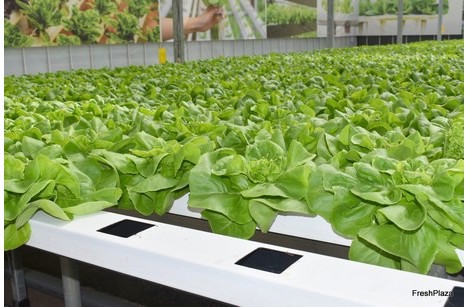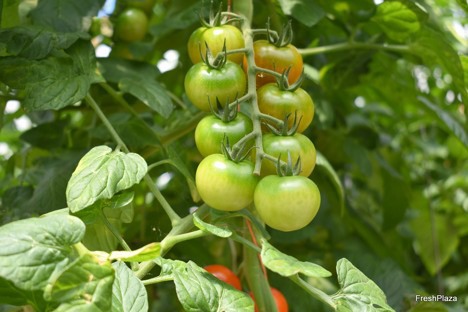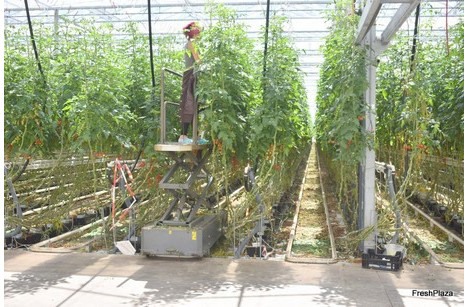At the vegetable farm Emsland Gemüse in Emsbüren, the peak season for tomatoes is now slowly coming to an end. "In terms of pricing, we are now above last year's level. In that respect, it's actually a shame that the high season is now coming to an end because prices have risen nicely in recent weeks. We are talking about a year-on-year increase of about 10 percent. However, it should be mentioned here that the rising minimum wages in Germany are having a negative impact on profit margins. We are on a good way, for a healthy market situation, also in view of the increased operating costs, a price increase of 30 percent would be desirable", describes farm manager Erwin Savenije on request.
Emsland Gemüse is the vegetable production branch of Emsland Flower and grows tomatoes on around 15 hectares. The range of varieties includes Brioso, Rivolo, Sweeterno, and, since last year, the new beef tomato Rebelski. "The cocktail tomato Brioso lagged somewhat in demand last year but is back to normal levels this year. Our newest variety, Rebelski, is also enjoying good, steady demand, although it is a relatively small product in terms of volume compared to the other varieties," Savenije reports. Across the entire range of varieties, the classic peak season runs from week 26 to week 38.
 Emsland Gemüse has been producing hydrosalads for its own consumption for several years now.
Emsland Gemüse has been producing hydrosalads for its own consumption for several years now.
Since last year, Emsland Gemüse has completely dispensed with gas and relies on two wood-fired power plants. These will be expanded by another plant, which will also convert the residual product into liquid CO2. "However, this system is not yet in operation, so we now have no CO2 available for the second year in a row. Nevertheless, we can look back on a very good year this year, both in terms of yield and quality, which is in no way inferior to previous years. Out of a total area of 15 ha, we were able to grow tomatoes without chemicals on 13.5 ha this season."
 The cocktail tomato Briose
The cocktail tomato Briose
Cultivation costs and HR varieties
A recurring theme in protected vegetable production is the continued rise in production costs. "Southern European growing countries, such as Spain, undoubtedly have the advantage of lower wages, but in contrast, the longer transport distances and increasing water problems must be taken into account. I, therefore, dare to say that the bottom-line production costs of our tomatoes are comparable to those of some imported tomatoes. Looking to the future, some farms are already working on sustainable, seasonal planning by importing tomatoes from abroad in the first quarter and sourcing locally from the Netherlands or Germany from mid-April/May. In that case, considerably less light and, thus, energy is needed. Personally, I think this is the right way to go," Savenije pleads.
In the long term, the use of HR varieties (highly resistant tomato varieties) will play an important role. Savenije says, "We are also currently conducting cultivation trials with these HR varieties, although the ToBRFV problem has not affected us so far. On the one hand, the shift towards these varieties is a good development for safety reasons, but on the other hand, I have yet to see a variety that is comparable in taste to our current varieties, especially Sweeterno."

View into the tomato greenhouse of Emsland Gemüse: The tomatoes are mainly packed in 650, and 350-gram containers, and 200-gram miniature containers are also used for the cocktail tomatoes.
At the beginning of this year's season, Emsland Gemüse already announced its ambitious new building plans. The groundbreaking ceremony for the new extension is scheduled to take place in next year. Savenije does not rule out the possibility that crops other than tomatoes will also find their way into the new greenhouse. "We have already been successfully cultivating hydrosalads for several years for our own use (for catering in the nearby adventure park). In the near future, bedding plants will continue to be the focus of our cultivation planning. Ideally, this cultivation will be complemented by a good summer crop, for example, in the form of a mixed plant with tomatoes, peppers, and perhaps even cucumbers. In that sense, we're innovative and agile, and we're open to new crops."
For more information:
Erwin Savenije
TB Emsland Gemüse GmbH
Sechs-Sterne-Weg 6
48488 Emsbüren
[email protected]
www.emsflower.de
